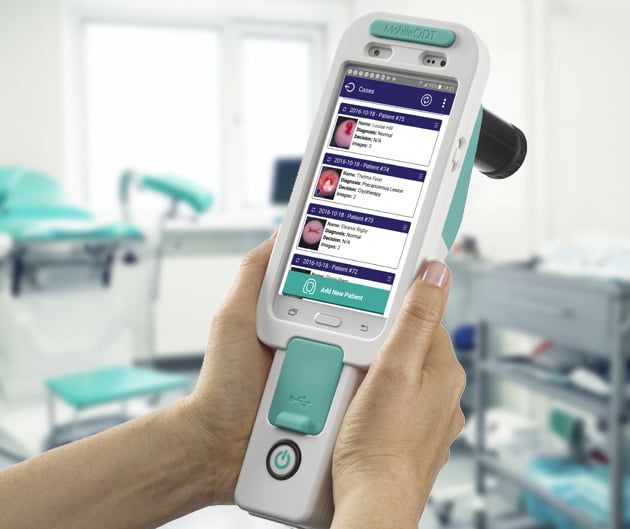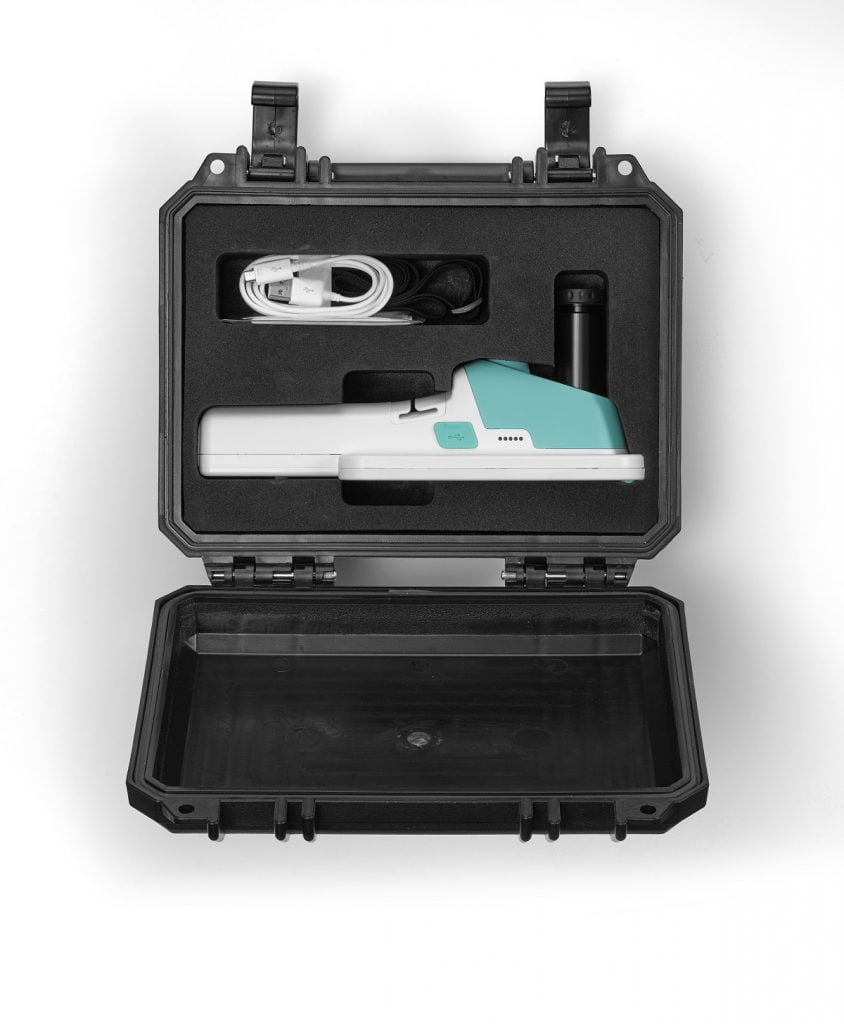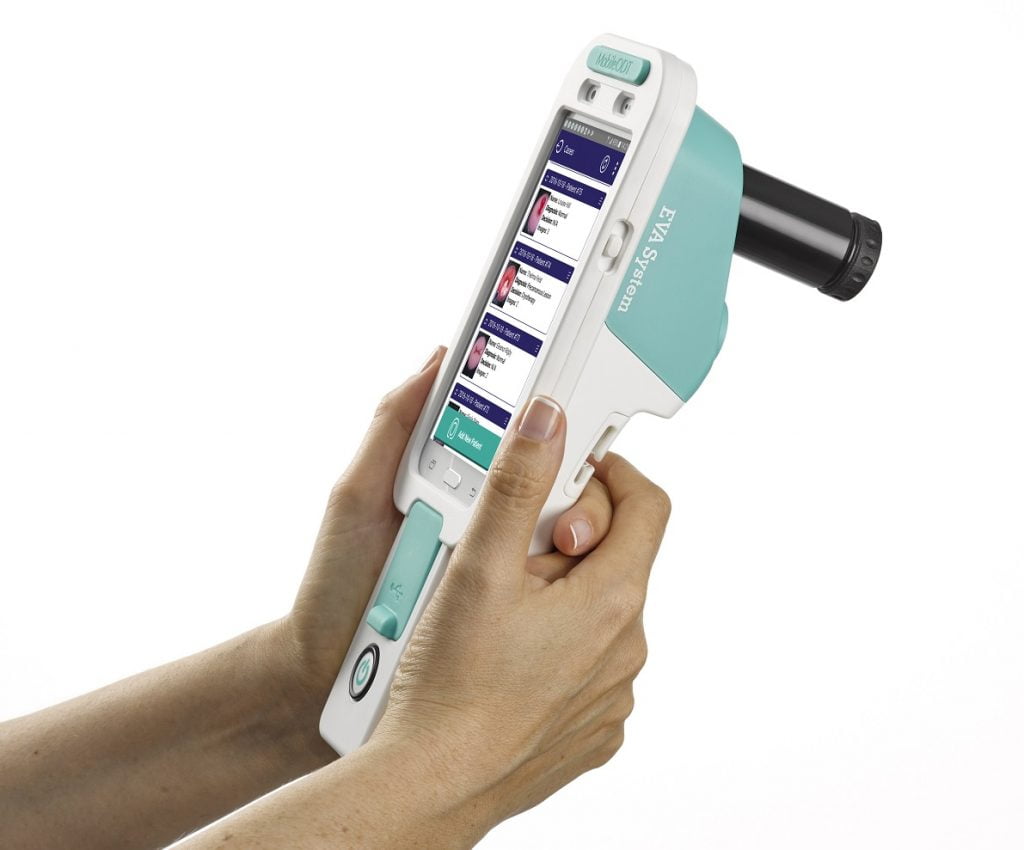In Israel, fewer than 50 percent of women ages 35-54, who are recommended to undergo a routine preventative screening pap smear once every three years, actually do the test, according to a report published in January 2019 by the Israel Cancer Association.
The test, a cervical cancer screening, can be an uncomfortable and even distressing experience for some but it can save lives. Cervical cancer is a treatable disease, and can often be found early, and sometimes, even prevented entirely, according to the association.
The pap smear itself is only the first procedure in keeping cervical cancer at bay. If pap results are abnormal, women will usually next undergo a colposcopy, an uncomfortable medical procedure that magnifies the cervix, vagina, and vulva to check for pre-malignant and malignant lesions.
SEE ALSO: Israeli Scientists Probe Benefits Of Cannabis To Treat Painful Gynecological Condition
Israeli startup MobileODT, founded in 2012, is hoping its mobile digital technologies and screening solutions can create a difference by making these tests more comfortable and accessible, and thus save more lives.
MobileODT is one of more than 200 Israeli startups currently breaking new ground in the Femtech space. Femtech is a sub-sector and buzzword in today’s health-tech arena that refers to technology and apps specifically aimed at – and offering solutions for – women’s health and well-being.
In mid-November, MobileODT announced a second round of institutional financing (of an undisclosed amount) to be used towards the launch of its AI-based cervical cancer screening test, VisualPap, in the coming months.
VisualPap is a point-of-care test for automated visual evaluation (AVE) of the cervix, using artificial intelligence to detect the presence of cervical dysplasia (pre-cancer) using digital images of the cervix. The test is set to launch in the coming months, starting in South Korea.
“We are excited to close this funding round just prior to the launch of VisualPap. It demonstrates the recognition of VisualPap’s potential to revolutionize cervical cancer screening,” MobileODT CEO Ariel Beery said in a statement. “We are grateful to our partners around the world, both clinical and commercial, for their faith and support in bringing this life-saving technology to practical application.”
The VisualPap screening test will be conducted from MobileODT’s Enhanced Visual Assessment System (EVA System) digital colposcope, strengthening the company’s point-of-care cervical cancer screening solution.
The digital colposcope, which the company says can detect cervical cancer more accurately and more cost-effectively than the standard colposcopy method used today, also curbs the often negative experience associated with the standard pap smear and coloscopy methods
Putting the possible discomfort of cervical exams aside, this FDA-cleared, smart mobile colposcope is a lifesaver for women in developing countries who lack access to cervical exams altogether.
A cervical cancer screen test in a handbag
As the field of Femtech expands, new technologies are being used in innovative ways in the women’s health arena.
In January of this year, TIME magazine ran a feature on an artificial intelligence-powered algorithm developed by NCI researchers, which, like MobileODT, analyzes mobile phone-quality images of a woman’s cervix to determine if it looks normal, precancerous or cancerous.
MobileODT’s EVA System, which combines advanced hardware with integrated software to serve clinical needs, is already revolutionizing the diagnostic process of cervical cancers. A prospective pilot study in South Korea earlier this year, showed that not only was the AI more reliable than tradition pap cytology but that the AI could detect cervical cancer after analyzing a single image. Results from the pilot study were presented at the 2019 ASCCP Annual Scientific Meeting in Atlanta, USA.
Moreover, the company’s EVA system is currently being used in more than 27 countries and is employed in 70 different healthcare systems in the United States.
So, how does the FDA-cleared colposcope work? There are three parts behind the magic.

The first part is its hardware — a cellphone that acts as a computer with a light source and magnifying lens as well as fire-proof and earthquake-proof casing. Eva’s cell phone design makes it affordable and mobile — it can even “fit inside a handbag,” says Rachel Gross, content and community manager for the company.
EVA’s second component is the cellphone’s machine learning-based Automated Visual Evaluation (AVE) algorithm. The algorithm assesses digital images of the cervix for signs of cancer or precancer and diagnoses patients accordingly. EVA has been uploading the photos for seven years, leading it to become the largest bank of cervical images in the world, Gross tells NoCamels.
Through a smartphone, EVA enables clinicians to easily document the information of patients. All documentation is found in one consolidated device.
Sign up for our free weekly newsletter
SubscribeThe third component to EVA is a storage system that automatically syncs the data of the device to online medical databases. This allows medical supervisors, who were not present at the appointment, to remotely view exams and check on patients.
This is not only faster and more cost-efficient than traditional cervical screenings, such as colposcopies and pap tests but it also more accurate, the company says.
Gross explains that while a Pap test is about 76 percent accurate, EVA’s algorithm is around 90 percent accurate. “EVA System gives users a superior clinical experience at a reduced capital cost,” she says.
Easing the examination process
According to the company, the device also acts as a superior form of sexual assault forensics. Victims of sexual assault are typically treated in hospital emergency rooms by certified Sexual Assault Nurse Examiners (SANEs). SANEs follow scientific and legal procedures to collect proper evidence for court.
Forensic examinations can be a cumbersome process and can last up to four hours. The victim may be poked, prodded, swabbed, and photographed in exactly the same places where she would have been violated in an attack.

EVA SANE offers higher levels of efficiency and comfort for assault victims, according to the company.
The system can securely and easily share patient records with law enforcement and legal teams. It uses high-contrast digital filters to highlight redness and locate areas that are suspect of bruising. The original images are coupled with filtered images for chain-of-custody purposes.
“The last thing you need when you experience sexual assault is a large piece of metal equipment between your legs. EVA is small and non-threatening,” says Gross.
The system can securely and easily share patient records with law enforcement and legal teams. It uses high-contrast digital filters to highlight redness and locate areas that are suspect of bruising. The original images are coupled with filtered images for chain-of-custody purposes.
“The last thing you need when you experience sexual assault is a large piece of metal equipment between your legs. EVA is small and non-threatening,” says Gross.
MobileODT also functions as a game-changer for people who live with significant geographic challenges, such as large bodies of water or mountain ranges between their community and the nearest hospital. EVA WELL offers teleconsultations, the diagnosis, and treatment of a patient from a site remote from the primary point of care. This enables women to receive a high level of care without having to travel long distances.
With EVA WELL, cervical exams are performed on a live video, connecting the patient to an expert in a different location, bringing healthcare to the sick, says Gross.
The future of remote gynecological care
“We use our phones every day, so let’s use them to save lives,” Beery said at a Google Talk presentation last year.
MobileODT is constantly looking for new ways to harness its technologies to better women’s health.
The award-winning startup was among six Israeli startups to be awarded a prize at the 2019 FT/IFC Transformational Business Awards in London, a prestigious impact-driven awards program set up by the International Finance Corporation, an arm of the World Bank Group, and the Financial Times. The company won first place for Transformational Solutions in Health.
In May, MobileODT joined 108 other Israeli companies in the annual GoforIsrael conference in Jinan, China. Firms in attendance were from the fields of biotech, water tech, environmental tech, IT, and energy.
Gross says that the company hopes to extend its technology to fields other than gynecology, such as Otorhinolaryngology, also known as Ear, Nose, and Throat.
Viva Sarah Press contributed to this report.
Related posts

Israeli Medical Technologies That Could Change The World

Harnessing Our Own Bodies For Side Effect-Free Weight Loss

Missing Protein Could Unlock Treatment For Aggressive Lung Cancer




Facebook comments